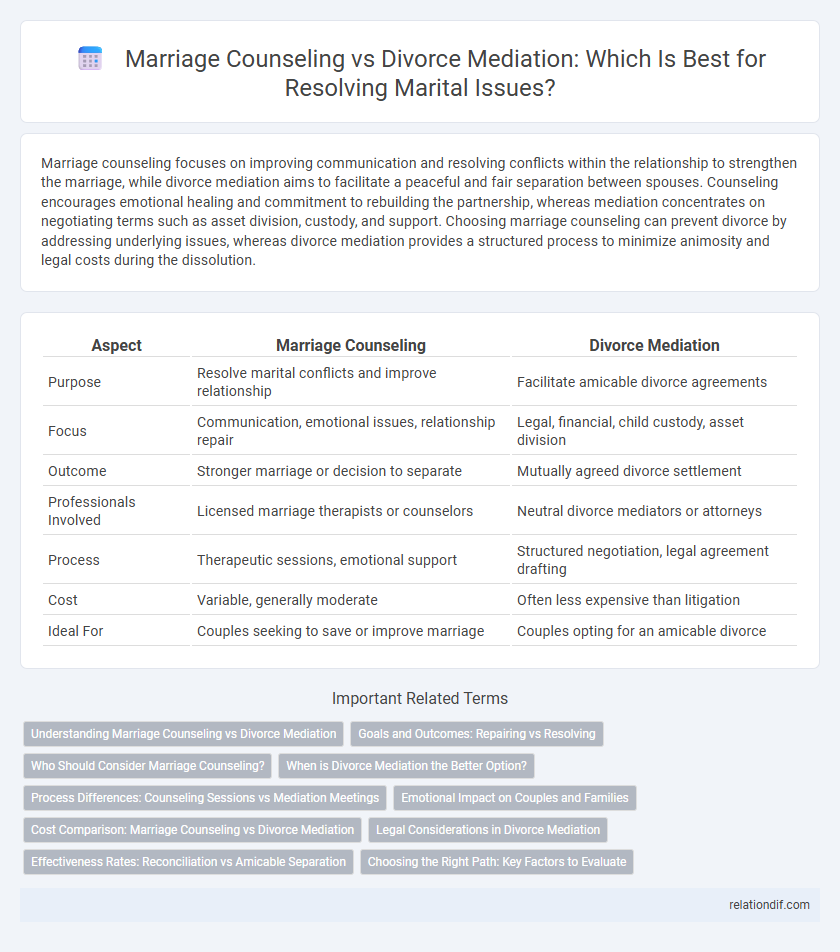Marriage counseling focuses on improving communication and resolving conflicts within the relationship to strengthen the marriage, while divorce mediation aims to facilitate a peaceful and fair separation between spouses. Counseling encourages emotional healing and commitment to rebuilding the partnership, whereas mediation concentrates on negotiating terms such as asset division, custody, and support. Choosing marriage counseling can prevent divorce by addressing underlying issues, whereas divorce mediation provides a structured process to minimize animosity and legal costs during the dissolution.
Table of Comparison
| Aspect | Marriage Counseling | Divorce Mediation |
|---|---|---|
| Purpose | Resolve marital conflicts and improve relationship | Facilitate amicable divorce agreements |
| Focus | Communication, emotional issues, relationship repair | Legal, financial, child custody, asset division |
| Outcome | Stronger marriage or decision to separate | Mutually agreed divorce settlement |
| Professionals Involved | Licensed marriage therapists or counselors | Neutral divorce mediators or attorneys |
| Process | Therapeutic sessions, emotional support | Structured negotiation, legal agreement drafting |
| Cost | Variable, generally moderate | Often less expensive than litigation |
| Ideal For | Couples seeking to save or improve marriage | Couples opting for an amicable divorce |
Understanding Marriage Counseling vs Divorce Mediation
Marriage counseling focuses on improving communication and resolving conflicts to strengthen the relationship, involving sessions with a licensed therapist skilled in emotional and behavioral issues. Divorce mediation, by contrast, is a legal process where a neutral mediator helps couples negotiate terms like asset division, child custody, and support agreements outside of court. Both approaches aim to reduce hostility and foster cooperation, but marriage counseling prioritizes relationship repair, while divorce mediation facilitates a smoother, mutually agreed separation.
Goals and Outcomes: Repairing vs Resolving
Marriage counseling aims to repair relationships by addressing underlying emotional issues and improving communication between partners. Divorce mediation focuses on resolving specific disputes such as asset division and custody arrangements to facilitate an amicable separation. Both approaches prioritize different outcomes: counseling seeks reconciliation and long-term relationship health, while mediation emphasizes practical solutions and minimizing conflict during divorce.
Who Should Consider Marriage Counseling?
Couples experiencing communication breakdowns, unresolved conflicts, or emotional disconnect should consider marriage counseling to rebuild trust and improve intimacy. Individuals seeking to strengthen their relationship or address specific issues such as infidelity, parenting challenges, or financial stress benefit from professional guidance in a therapeutic setting. Marriage counseling is ideal for those committed to repairing and deepening their partnership rather than ending it.
When is Divorce Mediation the Better Option?
Divorce mediation is the better option when both parties seek a cooperative and less adversarial approach to dissolving their marriage, aiming to retain control over decisions like asset division, child custody, and support agreements. It is particularly effective when communication remains civil and both spouses are willing to negotiate in good faith, reducing legal costs and emotional stress compared to traditional litigation. While marriage counseling focuses on preserving and improving the marital relationship, mediation centers on reaching mutually agreeable settlement terms when reconciliation is no longer a goal.
Process Differences: Counseling Sessions vs Mediation Meetings
Marriage counseling involves structured therapy sessions led by a licensed therapist to explore emotional issues, improve communication, and strengthen the relationship. Divorce mediation consists of facilitated meetings with a neutral mediator focused on negotiating terms of separation, such as asset division and child custody. Counseling prioritizes emotional healing and relationship repair, while mediation emphasizes practical resolution and agreement formulation.
Emotional Impact on Couples and Families
Marriage counseling aims to address the emotional turmoil experienced by couples, providing a supportive environment to rebuild trust and improve communication. Divorce mediation, while focused on resolution, often helps reduce conflict and emotional distress by facilitating respectful negotiations. Both approaches prioritize minimizing the negative emotional impact on families, promoting healthier coping mechanisms during challenging transitions.
Cost Comparison: Marriage Counseling vs Divorce Mediation
Marriage counseling typically costs between $75 and $200 per session, with couples often attending 6 to 20 sessions, leading to an average total expense of $900 to $4,000. Divorce mediation offers a more cost-effective alternative, ranging from $1,000 to $3,000 for the entire process, as it streamlines communication and legal agreements without prolonged sessions. Choosing divorce mediation over traditional counseling can significantly reduce financial strain during marital dissolution while providing structured negotiation support.
Legal Considerations in Divorce Mediation
Divorce mediation involves legal considerations such as the enforceability of mediated agreements and the necessity for both parties to fully disclose assets and liabilities for a fair settlement. Unlike marriage counseling, which focuses on improving communication and resolving conflicts, divorce mediation requires understanding family law statutes, custody arrangements, spousal support, and property division. Ensuring that mediation agreements comply with state laws is crucial to prevent future legal disputes and ensure a smooth divorce process.
Effectiveness Rates: Reconciliation vs Amicable Separation
Marriage counseling has an effectiveness rate of approximately 70% in fostering reconciliation and improving relational dynamics between partners. Divorce mediation shows success rates near 80% in achieving amicable separations, reducing conflict and lowering legal costs. Couples seeking resolution should consider these statistics to choose pathways aligning with their goals, whether reconciliation or peaceful divorce.
Choosing the Right Path: Key Factors to Evaluate
Evaluating the effectiveness of marriage counseling versus divorce mediation hinges on the couple's willingness to repair the relationship and communicate openly. Marriage counseling focuses on healing emotional wounds, improving communication skills, and fostering mutual understanding, making it ideal for couples seeking reconciliation. Divorce mediation emphasizes collaborative negotiation to resolve asset division and custody arrangements amicably, best suited for couples committed to a respectful separation.
marriage counseling vs divorce mediation Infographic

 relationdif.com
relationdif.com